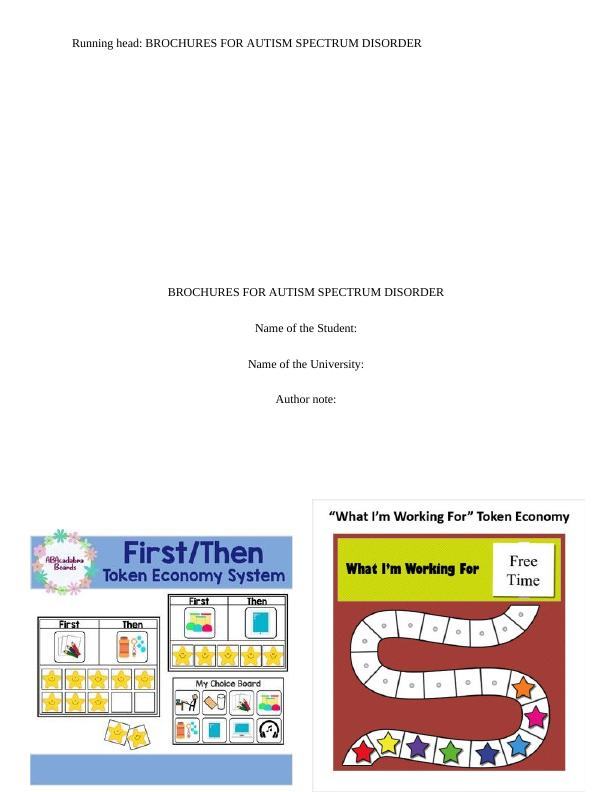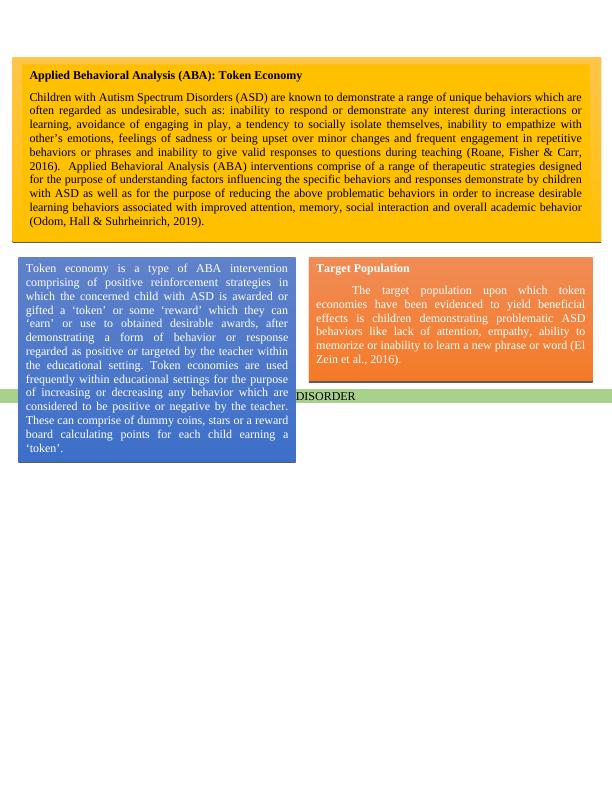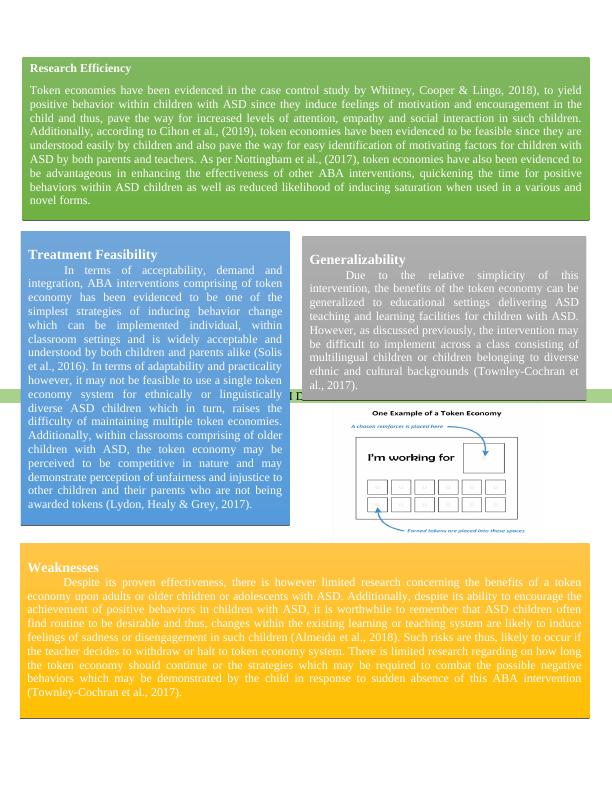Brochures Autism Spectrum Disorder 2022
Added on 2022-09-12
9 Pages3603 Words23 Views
Running head: BROCHURES FOR AUTISM SPECTRUM DISORDER
BROCHURES FOR AUTISM SPECTRUM DISORDER
Name of the Student:
Name of the University:
Author note:
BROCHURES FOR AUTISM SPECTRUM DISORDER
Name of the Student:
Name of the University:
Author note:

BROCHURES FOR AUTISM SPECTRUM DISORDER1
Target Population
The target population upon which token
economies have been evidenced to yield beneficial
effects is children demonstrating problematic ASD
behaviors like lack of attention, empathy, ability to
memorize or inability to learn a new phrase or word (El
Zein et al., 2016).
Token economy is a type of ABA intervention
comprising of positive reinforcement strategies in
which the concerned child with ASD is awarded or
gifted a ‘token’ or some ‘reward’ which they can
‘earn’ or use to obtained desirable awards, after
demonstrating a form of behavior or response
regarded as positive or targeted by the teacher within
the educational setting. Token economies are used
frequently within educational settings for the purpose
of increasing or decreasing any behavior which are
considered to be positive or negative by the teacher.
These can comprise of dummy coins, stars or a reward
board calculating points for each child earning a
‘token’.
Applied Behavioral Analysis (ABA): Token Economy
Children with Autism Spectrum Disorders (ASD) are known to demonstrate a range of unique behaviors which are
often regarded as undesirable, such as: inability to respond or demonstrate any interest during interactions or
learning, avoidance of engaging in play, a tendency to socially isolate themselves, inability to empathize with
other’s emotions, feelings of sadness or being upset over minor changes and frequent engagement in repetitive
behaviors or phrases and inability to give valid responses to questions during teaching (Roane, Fisher & Carr,
2016). Applied Behavioral Analysis (ABA) interventions comprise of a range of therapeutic strategies designed
for the purpose of understanding factors influencing the specific behaviors and responses demonstrate by children
with ASD as well as for the purpose of reducing the above problematic behaviors in order to increase desirable
learning behaviors associated with improved attention, memory, social interaction and overall academic behavior
(Odom, Hall & Suhrheinrich, 2019).
Target Population
The target population upon which token
economies have been evidenced to yield beneficial
effects is children demonstrating problematic ASD
behaviors like lack of attention, empathy, ability to
memorize or inability to learn a new phrase or word (El
Zein et al., 2016).
Token economy is a type of ABA intervention
comprising of positive reinforcement strategies in
which the concerned child with ASD is awarded or
gifted a ‘token’ or some ‘reward’ which they can
‘earn’ or use to obtained desirable awards, after
demonstrating a form of behavior or response
regarded as positive or targeted by the teacher within
the educational setting. Token economies are used
frequently within educational settings for the purpose
of increasing or decreasing any behavior which are
considered to be positive or negative by the teacher.
These can comprise of dummy coins, stars or a reward
board calculating points for each child earning a
‘token’.
Applied Behavioral Analysis (ABA): Token Economy
Children with Autism Spectrum Disorders (ASD) are known to demonstrate a range of unique behaviors which are
often regarded as undesirable, such as: inability to respond or demonstrate any interest during interactions or
learning, avoidance of engaging in play, a tendency to socially isolate themselves, inability to empathize with
other’s emotions, feelings of sadness or being upset over minor changes and frequent engagement in repetitive
behaviors or phrases and inability to give valid responses to questions during teaching (Roane, Fisher & Carr,
2016). Applied Behavioral Analysis (ABA) interventions comprise of a range of therapeutic strategies designed
for the purpose of understanding factors influencing the specific behaviors and responses demonstrate by children
with ASD as well as for the purpose of reducing the above problematic behaviors in order to increase desirable
learning behaviors associated with improved attention, memory, social interaction and overall academic behavior
(Odom, Hall & Suhrheinrich, 2019).

BROCHURES FOR AUTISM SPECTRUM DISORDER2
Research Efficiency
Token economies have been evidenced in the case control study by Whitney, Cooper & Lingo, 2018), to yield
positive behavior within children with ASD since they induce feelings of motivation and encouragement in the
child and thus, pave the way for increased levels of attention, empathy and social interaction in such children.
Additionally, according to Cihon et al., (2019), token economies have been evidenced to be feasible since they are
understood easily by children and also pave the way for easy identification of motivating factors for children with
ASD by both parents and teachers. As per Nottingham et al., (2017), token economies have also been evidenced to
be advantageous in enhancing the effectiveness of other ABA interventions, quickening the time for positive
behaviors within ASD children as well as reduced likelihood of inducing saturation when used in a various and
novel forms.
Weaknesses
Despite its proven effectiveness, there is however limited research concerning the benefits of a token
economy upon adults or older children or adolescents with ASD. Additionally, despite its ability to encourage the
achievement of positive behaviors in children with ASD, it is worthwhile to remember that ASD children often
find routine to be desirable and thus, changes within the existing learning or teaching system are likely to induce
feelings of sadness or disengagement in such children (Almeida et al., 2018). Such risks are thus, likely to occur if
the teacher decides to withdraw or halt to token economy system. There is limited research regarding on how long
the token economy should continue or the strategies which may be required to combat the possible negative
behaviors which may be demonstrated by the child in response to sudden absence of this ABA intervention
(Townley-Cochran et al., 2017).
Generalizability
Due to the relative simplicity of this
intervention, the benefits of the token economy can be
generalized to educational settings delivering ASD
teaching and learning facilities for children with ASD.
However, as discussed previously, the intervention may
be difficult to implement across a class consisting of
multilingual children or children belonging to diverse
ethnic and cultural backgrounds (Townley-Cochran et
al., 2017).
Treatment Feasibility
In terms of acceptability, demand and
integration, ABA interventions comprising of token
economy has been evidenced to be one of the
simplest strategies of inducing behavior change
which can be implemented individual, within
classroom settings and is widely acceptable and
understood by both children and parents alike (Solis
et al., 2016). In terms of adaptability and practicality
however, it may not be feasible to use a single token
economy system for ethnically or linguistically
diverse ASD children which in turn, raises the
difficulty of maintaining multiple token economies.
Additionally, within classrooms comprising of older
children with ASD, the token economy may be
perceived to be competitive in nature and may
demonstrate perception of unfairness and injustice to
other children and their parents who are not being
awarded tokens (Lydon, Healy & Grey, 2017).
Research Efficiency
Token economies have been evidenced in the case control study by Whitney, Cooper & Lingo, 2018), to yield
positive behavior within children with ASD since they induce feelings of motivation and encouragement in the
child and thus, pave the way for increased levels of attention, empathy and social interaction in such children.
Additionally, according to Cihon et al., (2019), token economies have been evidenced to be feasible since they are
understood easily by children and also pave the way for easy identification of motivating factors for children with
ASD by both parents and teachers. As per Nottingham et al., (2017), token economies have also been evidenced to
be advantageous in enhancing the effectiveness of other ABA interventions, quickening the time for positive
behaviors within ASD children as well as reduced likelihood of inducing saturation when used in a various and
novel forms.
Weaknesses
Despite its proven effectiveness, there is however limited research concerning the benefits of a token
economy upon adults or older children or adolescents with ASD. Additionally, despite its ability to encourage the
achievement of positive behaviors in children with ASD, it is worthwhile to remember that ASD children often
find routine to be desirable and thus, changes within the existing learning or teaching system are likely to induce
feelings of sadness or disengagement in such children (Almeida et al., 2018). Such risks are thus, likely to occur if
the teacher decides to withdraw or halt to token economy system. There is limited research regarding on how long
the token economy should continue or the strategies which may be required to combat the possible negative
behaviors which may be demonstrated by the child in response to sudden absence of this ABA intervention
(Townley-Cochran et al., 2017).
Generalizability
Due to the relative simplicity of this
intervention, the benefits of the token economy can be
generalized to educational settings delivering ASD
teaching and learning facilities for children with ASD.
However, as discussed previously, the intervention may
be difficult to implement across a class consisting of
multilingual children or children belonging to diverse
ethnic and cultural backgrounds (Townley-Cochran et
al., 2017).
Treatment Feasibility
In terms of acceptability, demand and
integration, ABA interventions comprising of token
economy has been evidenced to be one of the
simplest strategies of inducing behavior change
which can be implemented individual, within
classroom settings and is widely acceptable and
understood by both children and parents alike (Solis
et al., 2016). In terms of adaptability and practicality
however, it may not be feasible to use a single token
economy system for ethnically or linguistically
diverse ASD children which in turn, raises the
difficulty of maintaining multiple token economies.
Additionally, within classrooms comprising of older
children with ASD, the token economy may be
perceived to be competitive in nature and may
demonstrate perception of unfairness and injustice to
other children and their parents who are not being
awarded tokens (Lydon, Healy & Grey, 2017).

End of preview
Want to access all the pages? Upload your documents or become a member.
Related Documents
Brochures for Autism Spectrum Disorder Analysis 2022lg...
|10
|2749
|21